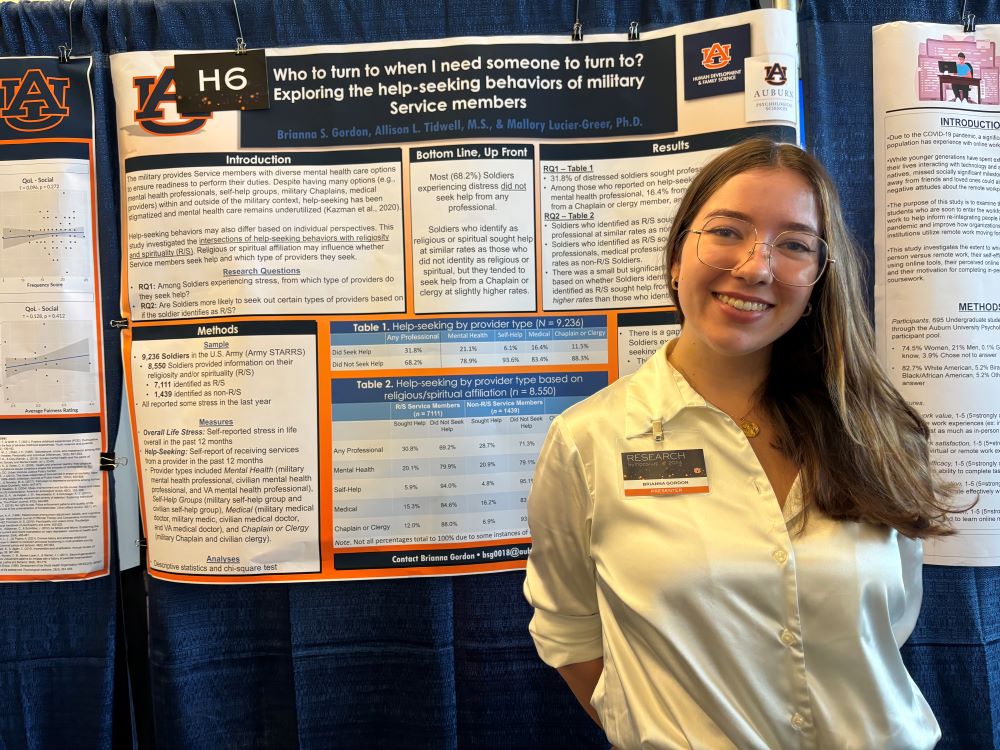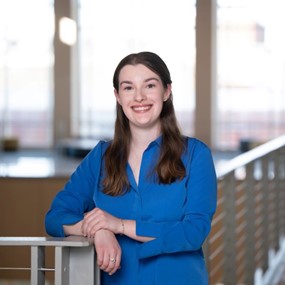Psychology student examines help-seeking behaviors of military service members

While the military provides service members with many forms of mental health care, there is a gap between the resources provided and service members using them. The stigma surrounding mental health in the military is intense, leading to many negative side effects, including suicide.
Brianna Gordon, a 2024 graduate in psychology who minored in counseling and social work, is looking to change the stigma around seeking mental health services in the United States military through determining relationships between religion, spirituality and help-seeking rates.
Gordon's father was a chaplain in the military for more than 30 years. Coming from a military family, she has grown up with many of the values, stigmas and functions of the armed forces.
"The first thing that the military instills in soldiers is a warrior ethos where you find out what your limits are. There's this intense unit mentality where you're only as strong as your weakest member," said Gordon. "So, when a unit member sees another unit member going to receive mental health services, it's like, 'Well, what's wrong with you? We have to keep going. You can't stop to try and better your mind. That's not what we do.'"
Through analyzing data from the Army Study to Assess Risk and Resilience in Servicemembers (STARRS) data set, Gordon was able to narrow her study to focus on help-seeking behaviors of soldiers who had experienced stress in the past year and whether their religion, religiosity or spirituality impacted who they sought help from and the rate at which they sought help.
"I pulled from the Army STARRS study, which is a massive dataset, so my sample size was ginormous compared to others. It was over 9,000 soldiers within the U.S. Army," said Gordon. "It was hard because the study only asked soldiers if they identify with a specific religion. They had another section for spirituality because spirituality is not religion, so they intersect but are two unique things. It was a lot of making my own logical assumptions on what the data was saying."
Gordon's analysis of the research yielded unfortunate yet unsurprising results. The majority of those surveyed (68.2%) did not seek help from a professional. Additionally, religiosity and spirituality did not impact the rate at which service members sought help, although those who identified as religious or spiritual sought help from chaplains or other clergy members more often than those who didn't identify as religious and spiritual.
As the military considers future steps to curb the mental health stigma surrounding its service members, Gordon believes it starts with military leadership encouraging members to seek help. Furthermore, Gordon emphasizes the potential for a collaborative model for chaplains and mental health professionals to work jointly.
"There's a hierarchy complex within the military, so if the ones from the top are encouraging the ones from the bottom to seek help, I am more than positive that we will see such a higher rate of those seeking help for their mental health issues or problems," said Gordon. "Mental health practitioners are very coveted within the military. Chaplains, however, are going to be with every unit, no matter the size or deployment. Mental health practitioners and chaplains have this amazing possibility to bounce off each other and collaborate."
In addition to presenting at the Auburn Research Symposium, Gordon attended the 2024 Southeastern Council of Family Relations (SECFR) conference where she was able to present her research and learn from other attendees. At the conference, Gordon received an award for "outstanding undergraduate poster presentation."
"My project was jointly funded by the College of Liberal Arts and College of Human Sciences. They were able to help me attend the SECFR conference and allow me to get my work recognized on a bit of a bigger level," said Gordon. "There were colleges from all around the southeast specifically who attended, and it was a very good learning experience. I would not have been able to go without help from the College of Liberal Arts."
Learn more about psychology in the College of Liberal Arts.






